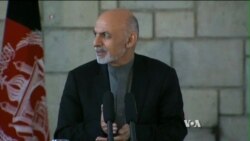Months after taking office in the first democratic transition of power in Afghanistan, Afghan President Ashraf Ghani and his Chief Executive Abdullah Abdullah will meet with U.S. President Barack Obama on March 24. The talks at the White House are expected to center on security, economic development and reconciliation with the Taliban.
With most international combat forces gone from their country, Afghan military and police personnel have not only taken control of security, but also borne the brunt of Taliban violence that seems to be escalating, not ebbing.
Nearly a year earlier Obama announced a timetable for U.S. withdrawal from Afghanistan.
“We will bring America’s longest war to a responsible end," he said.
Media reports this week quoted U.S. officials who say the commander-in-chief may be reconsidering his plan to cut in half by the end of 2015 some 9,800 U.S. troops currently serving in a training and counter-terror capacity.
White House Press Secretary Josh Earnest has not confirmed those reports.
“The president will listen carefully to the advice that he is getting from his national security team and his military commanders on this matter - that is the pace of the drawdown," he said.
The drawdown and whether to keep certain U.S. bases open longer than expected will likely be the focus when Ghani arrives in Washington for talks.
This will be his first visit since taking power, succeeding former President Hamid Karzai who left office refusing to sign a bilateral security agreement with the United States. Ghani immediately signed the deal, lifted a Karzai ban on night raids and has pledged economic, electoral and security reforms.
Aarthi Gunasekaran, with the Center for American Progress, says the talks, while focused on security and economic issues, will also be an opportunity for both nations to re-energize their commitment to each other.
“The big part is assuring and finding recognition that if President Ghani is going to look at anti-corruption efforts and reform, ‘we are with you.’ And we are excited that they are really realizing that’s at the core of what needs to happen," said Gunasekaran.
Ghani and Chief Executive Abdullah have made economic development and growth a top priority - key in a country torn apart by decades of war and where nearly 70 percent of the Afghan population is under 25.
Gunasakeran says with time, the focus of the U.S.-Afghanistan relationship will follow suit.
“We will very much transition from a security lens perspective, to the economic development piece, especially," she said.
The South Asia analyst says with the necessary reforms and progress, Afghanistan’s role in the international community can shift from being that of an economic beneficiary to an economic player in the years ahead.





